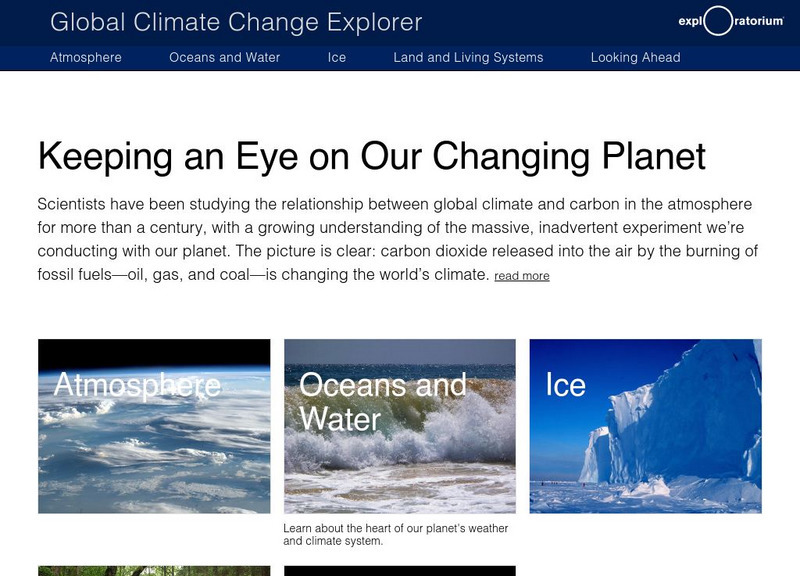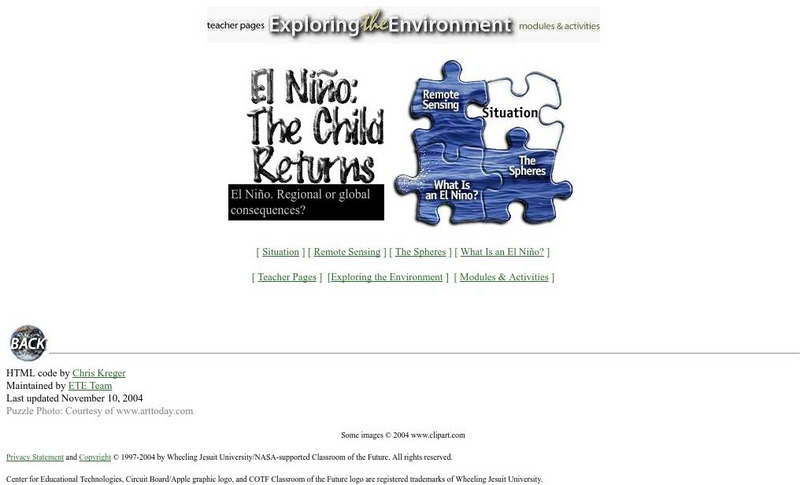Hi, what do you want to do?
Other
The Geological Society: Climate Change: Evidence From the Geological Record
In this statement, The Geological Society describes the changes that are happening to the global climate in terms of what evidence has been observed in our geological history. For example, what happened during past events of rapid...
NASA
Nasa: Earth Observatory: The Carbon Cycle
Learn about the element carbon and its importance on the Earth's atmosphere and sustainability of life on the planet. Additionally, understand the role the carbon cycle plays in global climate change over time.
NASA
Jet Propulsion Laboratory: Global Climate Change: Sea Level Viewer
This viewer allows you to see ocean heat storage from space. These images indicate sea surface heights. Learn more about El Nino and La Nina and how they have profound effects on world climate.
University of Colorado
University of Colorado: Ph Et Interactive Simulations: Molecules and Light
Do you ever wonder how a greenhouse gas affects the climate, or why the ozone layer is important? Use the sim to explore how light interacts with molecules in our atmosphere.
University of Colorado
University of Colorado: Ph Et Interactive Simulations: Molecules and Light
An interactive simulation that teaches about molecules, photons, and absorption by exploring how light interacts with molecules in our atmosphere. Through this simulation students can get a better understanding of the importance of the...
TED Talks
Ted: Ted Ed: Rachel Pike: The Science Behind a Climate Headline
In this brief video tutorial, atmospheric chemist Rachel Pike provides a glimpse of some of the methods that scientists are using today to study climate change and Earth's atmosphere. [4:14]
Science Education Resource Center at Carleton College
Serc: Exploring Ncar Climate Change Data Using Gis
With ArcGIS and climate data from the National Center for Atmospheric Research Climate Change Scenarios GIS Data Portal, young scholars learn the basics of GIS-based climate modeling.
TED Talks
Ted: Ted Ed: Is Our Climate Headed for a Mathematical Tipping Point?
Scientists have warned that as CO2 levels in the atmosphere rise an increase in Earth's temperature by even two degrees could lead to catastrophic effects across the world. But how can such a tiny, measurable change in one factor lead to...
Exploratorium
Exploratorium: Global Climate Change: Research Explorer
Explore scientific data relating to the atmosphere, oceans, areas covered by ice, and living organisms in all these domains. Interpret past and present climate data to predict future climate change and its possible effects.
Other
Mcdwn: Climate
Wonderful site! Learn about climates and gather helpful information. When you are done, take the climates quiz to show what you have learned.
University Corporation for Atmospheric Research
Ucar: Why Does Climate Change?
Factors that have the power to change global climate can be natural, like volcanic eruptions and changes in solar energy, or caused by humans, like the addition of greenhouse gases to the atmosphere.
PBS
Pbs Learning Media: Global Climate Change: The Effects of Global Warming
Students conduct an investigation to determine CO2 levels in four different gas samples, examine evidence of global warming in our environment, and consider their own role in contributing to global warming.
TED Talks
Ted: Ted Ed: Cloudy Climate Change: How Clouds Affect Earth's Temperature
As the Earth's surface temperature gradually rises, it has become vital for us to predict the rate of this increase with as much precision as possible. In order to do that, scientists need to understand more about aerosols and clouds....
Other
Conservation Corps Newfoundland and Labrador: Climate Change Club
Join the fun at the Climate Change Club where you can find out ways to take action at home, in school, and in your community. Keep up with the latest news in climate science, and link to fact sheets and other fun sites that care about...
NASA
Lightning & Atmospheric Electricity Research at the Ghcc
This is the homepage for the Global Hydrology and Climate Center's Lightning Team. On this site, you will data from the Lightning Team's experiments; documents, reports, press releases, and an assortment of other information related to...
Mocomi & Anibrain Digital Technologies
Mocomi: Major Domains of the Earth Atmosphere
Learn about the atmosphere and its different layers.
Other
Global Climate Observing System
"This web site provides information on world weather and climate conditions as well as global climate change with respect to mean sea level and terrestrial ecosystems."
NOAA
Noaa: National Weather Service: Jet Stream: Jet Stream Learning Lessons
Here's a comprehensive list of lesson plans offered by the National Weather Service covering the gamut of weather topics from the atmosphere to synoptic meterology. The plans include objectives, supplies necessary for the lesson, teacher...
Center for Educational Technologies
Exploring the Environment El Nino: The Child Returns
Use remote sensing data and background information to look at regional and global consequences of El Nino. Try working with the 'situation' to test your understanding.
NASA
Nasa: Climate Kids: What Is the Greenhouse Effect
Find out how Earth's atmosphere acts like a greenhouse, and the effect this has on ecosystems.
Utah Education Network
Uen: Introduction to Climate Change
This is designed to be an introductory instructional activity to climate change. It covers the importance of the atmosphere, the basics of the "Greenhouse Effect" and an introduction to the human contribution to increased greenhouse gases.
NOAA
Noaa: National Climatic Data Center: Groundhog Day
Find background about Groundhog Day and the folklore involved. Look through the charts that show how closely Punxsutawney Phil's predicitions align with the actual weather.
Other
Florida Department of Environmental Protection: Climate Change and Coral Reefs
Find out about the devastating effects climate change is having on Florida's coral reef ecosystems.
Climate Literacy
Clean: Ocean Currents and Sea Surface Temperature
To discover the link between ocean temperatures and currents as related to our concern for current climate change.






















